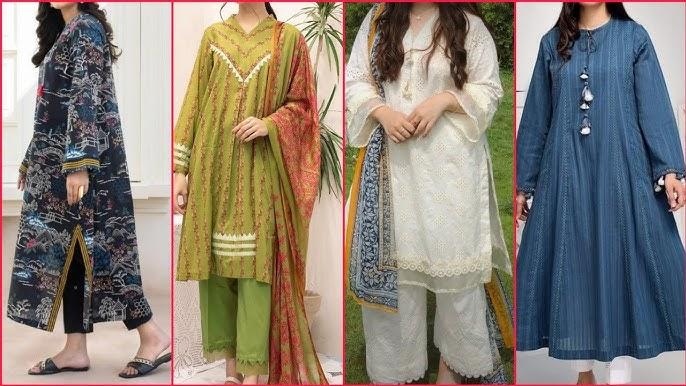In today’s fast-paced fashion world, one question keeps popping up: Should you choose handcrafted or machine-made clothing?
Both have their charm — one celebrates art and tradition, while the other focuses on efficiency and accessibility. But when it comes to quality, ethics, and sustainability, the choice isn’t as simple as it looks.
Understanding Handcrafted Clothing
Handcrafted clothing is made with human skill and creativity. It’s not rushed or mass-produced — every stitch, dye, and pattern reflects the artisan’s personal touch. Whether it’s hand-embroidered shawls from Multan or block-printed fabrics from Sindh, each piece tells a story of craftsmanship and culture.
Understanding Machine-Made Clothing
Machine-made clothing, on the other hand, relies on industrial machinery and automation. It’s fast, cheap, and efficient — the backbone of modern fashion. But the trade-off? Less individuality and often lower-quality materials designed for short-term wear.
The Beauty of Handcrafted Clothing
There’s something deeply human about handcrafted garments. The uneven stitch, the slight variation in color — these aren’t flaws, they’re signatures of authenticity.
Handcrafted clothing connects you with generations of artisans who’ve preserved techniques for centuries. Each piece is unique, often passed down like an heirloom.
The Efficiency of Machine-Made Clothing
Machine-made fashion wins in speed and scalability. You can get a perfectly fitted shirt in minutes, in any size or color. Factories can produce thousands of pieces daily — keeping costs low and wardrobes full. It’s convenient, accessible, and ideal for people on a budget.
Quality Comparison
When it comes to quality, handcrafted garments often outlast machine-made ones. Artisans take time to reinforce seams and use natural fabrics, while machines prioritize volume over precision.
That said, not all handcrafted pieces are perfect — quality depends on the skill of the maker. Likewise, some machine-made clothes can be premium, depending on the brand and material used.
Environmental Impact
Handcrafted clothing is usually more eco-friendly. Many artisans use organic materials and traditional dyeing methods with minimal waste.
Machine-made clothing, especially from fast fashion brands, contributes to textile waste, microplastic pollution, and carbon emissions. In short — fast production often means faster destruction of the planet.
Economic Impact
When you buy handcrafted clothing, you’re supporting livelihoods — not corporations. You’re helping families preserve ancestral skills and sustain local economies.
Machine-made fashion, however, powers global industries, creating millions of jobs — but often under poor working conditions and low wages.
Ethical Considerations
Ethics is where handcrafted clothing shines. Most artisans work in transparent environments, while large factories sometimes hide exploitative practices behind closed doors.
From child labor to unsafe factories, machine-made fashion’s darker side is hard to ignore.
Read more: cross stitch bridal collection, niamia sale, elan uk, limelight clothes uk, rang rasiya collection, zaha uk, Faiza Saqlain uk
Cultural and Emotional Value
Every handcrafted piece has a soul. It carries the emotion and effort of the person who made it. Wearing handcrafted clothing is like wearing art — something created with intention, not just profit.
Machine-made clothes rarely evoke that same connection.
Fashion and Identity
Your clothes tell your story. Handcrafted outfits speak of individuality and pride in heritage. They reflect your values — creativity, sustainability, and authenticity.
Machine-made outfits, while trendy, often reflect mass culture — everyone wearing the same thing.
Price vs. Value
Sure, handcrafted clothes cost more upfront. But think of it as an investment. They last longer, age beautifully, and don’t lose meaning over time.
Machine-made clothes may seem cheaper, but frequent replacements add up — financially and environmentally.
Sustainability and the Future of Fashion
The future of fashion lies in balance — blending the precision of machines with the ethics of handcraft. “Slow fashion” is gaining ground, encouraging consumers to buy less, but better.
Tech innovations like 3D printing and biodegradable fabrics might soon make sustainable production accessible to all.
How to Choose What’s Right for You
Here’s how you can strike the right balance:
-
Know your purpose: Need daily wear? Machine-made might work. Want timeless pieces? Go handcrafted.
-
Check the label: Look for ethical sourcing and natural fabrics.
-
Support local: Buy from artisans and ethical brands.
-
Buy less, wear more: Quality over quantity always wins.
Conclusion
Choosing between handcrafted and machine-made clothing isn’t just about fashion — it’s about values.
If you care about sustainability, ethics, and authenticity, handcrafted clothing offers a meaningful alternative. But if affordability and practicality matter most, machine-made clothes have their place too.
In the end, it’s about making mindful choices that align with who you are — not just what you wear.
FAQs
1. Are handcrafted clothes better quality than machine-made?
Generally yes — handcrafted clothes have superior stitching, attention to detail, and durability.
2. Why are handcrafted clothes more expensive?
They require more time, effort, and skill to make, often using higher-quality materials.
3. Can machine-made clothes be sustainable?
Yes, if brands use ethical practices and eco-friendly materials, though it’s less common.
4. Do handcrafted clothes last longer?
With proper care, handcrafted garments often last for years, even decades.



